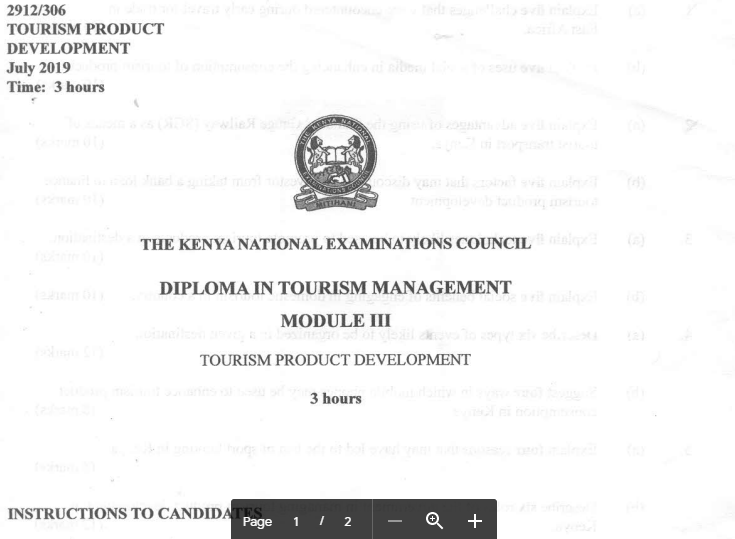Get free Diploma in tourism management module 3 KNEC past papers on this site inclusive of all units. We have compiled you several KNEC past papers from past years both July and November KNEC series to help you get started and improve your learning.
Diploma in tourism management module 3 units
- Ecotourism
- Tourism policy and planning
- Principles and practices of management
- Tourism product development
- Tourism law 3
- Tourism marketing
This is the full list of Diploma in tourism management module 3 units which are examined by KNEC and are available for download in pdf format on this page.
Get comprehensive access of all Diploma in tourism management module 3 KNEC past papers for free. All you need to do is to download the papers to save them on your device for free in soft copy format
If you find this article helpful we kindly urge you to subscribe to our newsletters using your email to receive timely updates, also share this site with your fellow students and friends so that they can learn and benefit from our free resources.
Benefits of KNEC past papers
As a student of Diploma in tourism management module 3, it is important to have these KNEC past papers because;
- It improves learners knowledge
- Helps you understand the units taught
- Gives the learners insight on what kind of questions to expect
- Prepares learners for their main end of course exam.
- Supplements learner’s education.
Diploma in tourism management module 3 KNEC past papers pdf download
- Ecotourism KNEC past papers
- Tourism policy and planning KNEC past papers
- Principles and practices of management KNEC past papers
- Tourism product development KNEC past papers
- Tourism law 3 KNEC past papers
- Tourism marketing KNEC past papers
Diploma in tourism management module 3 Course outline
Ecotourism Course outline
This unit studies Ecological principles applied to tourism; principles of human behavior used in eco‐tourism issues; the relationship between natural resources and tourism; planning and management of natural, cultural resources and peoples way of life for sustainable use in tourism with special focus on rural areas, wildlife sanctuaries and other areas of forests, mountains, beaches and islands
Tourism policy and planning Course outline
This unit introduces trainees to key concepts associated with tourism policy and planning and the practical experience of analysis in, and application to, contemporary case studies. The unit examines contemporary global tourism issues from the perspectives of government and business.
This course integrates the knowledge developed in Fundamentals of Tourism, Tourism Law/Economics of Tourism and Destination Marketing into a course that uses government policy and planning as the conceptual framework. It examines the importance of tourism policy and planning in terms of sustainable tourism development, addressing the central role of tourism public policy development.
Principles and practices of management Course outline
PPM unit outlines the activities that “plan, organize, and control the operations of the basic elements of people, materials, machines, methods, money and markets, providing direction and coordination, and giving leadership to human efforts, so as to achieve the sought objectives in an Organization.
Tourism law 3 Course outline
This unit Tourism law is an exclusive field of laws that combines basic government laws with rules particular to the travel and hospitality industries. The goal of tourism law, is to provide a legal framework for the appropriate growth and control of tourism operations.
Tourism marketing Course outline
Tourism marketing is the collective name given to the various marketing strategies used by businesses within the tourism industry. This includes, for example, hotels and other forms of accommodation, along with airlines, car rental services, restaurants, entertainment venues, travel agents and tour operators.
MORE FREE KNEC PAST PAPERS:
- Diploma in ICT module 2 KNEC past papers Free download
- Diploma in ICT module 3 KNEC past papers Free download
- Certificate in ICT module 1 KNEC past papers Free download
- Certificate in ICT module 2 KNEC past papers Free download
- Diploma in Electrical and electronic engineering module 1 KNEC past papers Free download
- Diploma in electrical and electronic engineering module 2 KNEC past papers Free download
- Diploma in Human resource management module 1 KNEC past papers Free download
- Diploma in human resource management module 2 KNEC past papers Free download
- Craft in supply chain management module 1 KNEC past papers Free download
- Diploma in building technology module 1 KNEC PAST papers
- Diploma in building and technology module 2 KNEC past papers
- Diploma in building and technology module 3 KNEC past papers
- Diploma in civil engineering module 1 KNEC PAST PAPERS
- Diploma in civil engineering module 2 KNEC PAST PAPERS
- Diploma in civil engineering module 3 KNEC PAST PAPERS
- Certificate in electrical and electronic engineering module 1 KNEC PAST PAPERS
- Certificate in electrical and electronic engineering module 2 KNEC PAST PAPERS
- Craft in supply chain management module 2 KNEC PAST PAPERS
- Diploma in Quantity survey KNEC past papers
- Certificate in plumbing module 1 KNEC past papers
- Certificate in building and technology module 1 KNEC past papers
- Certificate in building and technology module 2 KNEC past papers
- Diploma in social work and community development module 1 KNEC past papers
- Diploma in social work and community development module 2 KNEC past papers
- Diploma in social work and community development module 3 KNEC past papers
- Diploma in electrical and electronic engineering module 3 KNEC past papers
- Diploma in Human resource management module 3 KNEC past papers
- Diploma in supply chain management module 3 KNEC past papers
- Diploma in supply chain management module 1 KNEC past papers
- Certificate in human resource management module 2 KNEC past papers
- Diploma in supply chain management module 2 KNEC past papers
- Certificate in human resource management module 1 KNEC past papers
- Certificate in food and beverage module 1 KNEC past papers
- Certificate in food and beverage module 2 KNEC past papers
- Diploma in catering and accommodation module 1 KNEC past papers
- Diploma in catering and accommodation module 2 KNEC past papers
- Diploma in catering and accommodation module 3 KNEC past papers
- Diploma in food and beverage module 1 KNEC past papers
- Diploma in food and beverage module 2 KNEC past papers
- Diploma in food and beverage module 3 KNEC past papers
- Diploma in tourism management module 1 KNEC past papers
- Diploma in tourism management module 2 KNEC past papers
- Certificate in tour guiding and travel operations module 1 KNEC past papers
- Certificate in tour guiding and travel operations module 2 KNEC past papers
- Diploma in business management module 1 KNEC past papers
- Diploma in business management module 2 KNEC past papers
- Diploma in business management module 3 KNEC past papers
- Diploma in sales and marketing module 1 KNEC past papers
- Diploma in sales and marketing module 2 KNEC past papers
- Diploma in sales and marketing module 3 KNEC past papers
- Certificate in business management module 1 KNEC past papers
- Certificate in business management module 2 KNEC past papers
- Certificate in project management module 1 KNEC past papers
- Certificate in project management module 2 KNEC past papers
- Certificate in sales and marketing module 1 KNEC past papers
- Diploma in agriculture module 1 KNEC past papers
- Diploma in agriculture module 2 KNEC past papers
- Diploma in agriculture module 3 KNEC past papers
- Diploma in early childhood development KNEC past papers
- Certificate in early childhood development and education KNEC past papers

